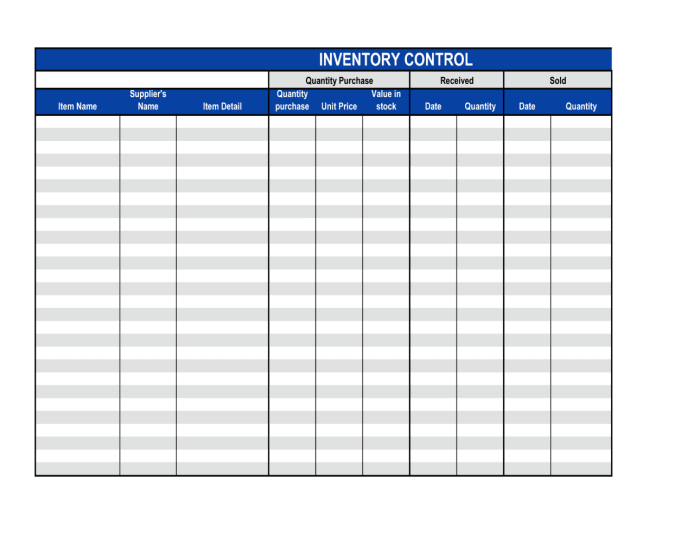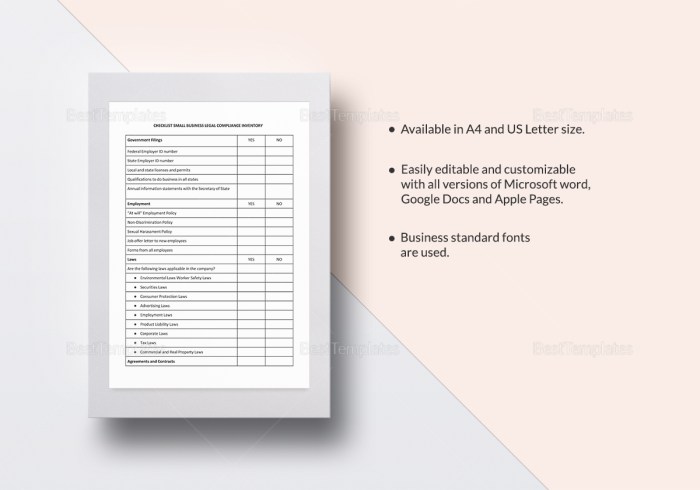The Legal Status of Business Inventory Sheets

Source: business-in-a-box.com
Are business inventory sheets legal documents 4 – Business inventory sheets, while not inherently legal documents like contracts or deeds, can hold significant legal weight depending on the context. Their accuracy and proper maintenance are crucial for various legal and business purposes, impacting tax compliance, business transactions, and even potential litigation.
Legal Weight of Inventory Sheets, Are business inventory sheets legal documents 4
Inventory sheets serve as evidence of the goods a business possesses. In legal proceedings, they can corroborate claims regarding inventory levels at a specific point in time. For example, an accurate inventory sheet could support a claim in an insurance claim following a theft or a natural disaster. Conversely, discrepancies could weaken a business’s position.
Situations where inventory sheets hold significant legal weight include insurance claims, audits, and disputes arising from sales transactions. Conversely, they might lack legal weight if poorly maintained, undocumented, or if better evidence exists. A court would consider the overall context, including the sheet’s creation, maintenance, and potential for manipulation.
An inventory sheet’s admissibility as evidence depends on factors such as its authenticity, accuracy, and the chain of custody. If a sheet is demonstrably accurate and maintained according to best practices, it stands a higher chance of being accepted as evidence. However, if it’s poorly maintained or shows signs of alteration, its credibility will be diminished.
While business inventory sheets themselves aren’t inherently legal documents in the same way a contract is, accurate record-keeping is crucial for legal compliance. Maintaining detailed inventory records can be simplified significantly by using helpful software; consider exploring options like those listed in this helpful resource: 100 free small business inventory software. Properly maintained inventory sheets, whether managed manually or digitally, are vital for tax purposes and can be valuable evidence in various legal contexts.
Inventory Sheets and Tax Compliance
Accurate inventory sheets are fundamental to tax compliance. Tax authorities use inventory data to verify a business’s reported income and expenses. Discrepancies can lead to audits and potential penalties.
Discrepancies in inventory data can result in miscalculations of cost of goods sold (COGS), leading to either underpayment or overpayment of taxes. Underreporting inventory could result in lower tax liability in the short term but expose the business to significant penalties if detected during an audit. Overreporting could lead to unnecessary tax burdens.
Hypothetical Scenario: A small retail business inaccurately records its inventory, underreporting its closing inventory at the end of the financial year. This leads to an overstatement of COGS, resulting in a lower reported income and lower tax liability. During a tax audit, the discrepancy is discovered, resulting in significant penalties and interest charges for tax evasion.
Legal requirements for inventory record-keeping vary across industries. Highly regulated industries, like pharmaceuticals or food processing, often face stricter regulations and more frequent audits compared to less regulated sectors.
Inventory Sheets and Business Transactions
Accurate inventory sheets are vital for smooth and legally sound business transactions. They ensure accurate invoicing, tracking of goods, and prevent disputes.
| Transaction Type | Inventory Sheet Use | Legal Implications | Example |
|---|---|---|---|
| Wholesale Sale | Verifying quantity and type of goods shipped | Supports accurate invoicing and prevents disputes over quantities | A wholesaler uses inventory sheets to confirm the number of units shipped to a retailer, preventing later disputes over short shipments. |
| Retail Sale | Tracking sales, managing stock levels, and preventing theft | Provides evidence of sales and inventory levels for tax purposes and resolving customer disputes | A retailer uses inventory sheets to track sales and reconcile with point-of-sale data, ensuring accurate accounting and preventing discrepancies. |
| Returns | Recording returned goods and updating stock levels | Ensures accurate accounting and prevents inventory discrepancies | A retailer uses inventory sheets to record returned goods and update stock levels, preventing overstocking or inaccurate accounting. |
| Inventory Transfer | Tracking movement of goods between locations | Provides audit trail for internal controls and preventing loss or theft | A company with multiple warehouses uses inventory sheets to track the transfer of goods between locations, maintaining accurate records across all sites. |
Discrepancies in inventory data can lead to disputes in business transactions. For instance, if a wholesaler ships fewer goods than indicated on the invoice, the retailer can use their inventory sheet to support their claim.
Inventory Management Software and Legal Compliance
Using inventory management software significantly enhances the legal standing of inventory records. Automated systems offer improved accuracy, traceability, and auditability compared to manual methods.
Features such as automated data entry, real-time tracking, and audit trails enhance legal compliance. These features minimize human error and provide a clear record of inventory movements. Best practices include regular data backups, access control, and employee training on proper software usage.
Relying solely on manual methods increases the risk of errors, loss of data, and difficulty in demonstrating compliance during audits. This can lead to penalties, disputes, and reputational damage.
Data Security and Inventory Sheets

Source: besttemplates.com
Storing inventory data digitally introduces legal obligations related to data security and privacy. Businesses must implement robust security measures to protect sensitive inventory information from unauthorized access, loss, or theft.
A plan for securing digital inventory data should include: access controls (usernames, passwords, and role-based access), encryption of data both in transit and at rest, regular security audits, and incident response procedures.
- Regular data backups to a secure offsite location
- Implementation of a disaster recovery plan
- Employee training on data security best practices
- Use of strong passwords and multi-factor authentication
- Regular software updates and patching
Specific Legal Frameworks and Inventory Records
Various laws and regulations govern the maintenance of business inventory records. The Sarbanes-Oxley Act (SOX), for example, imposes stringent requirements on publicly traded companies regarding financial record-keeping, including inventory. Other relevant regulations might include industry-specific standards or tax laws.
Legal requirements for inventory record-keeping vary significantly across jurisdictions. Understanding these differences is crucial for businesses operating in multiple locations. Penalties for non-compliance can range from financial fines to legal action, depending on the severity of the violation and the applicable laws.
Industry-specific regulations further impact inventory record-keeping. For instance, the food and beverage industry faces stricter regulations related to traceability and food safety, requiring detailed inventory records to ensure product safety and prevent contamination.
Frequently Asked Questions: Are Business Inventory Sheets Legal Documents 4
What happens if my inventory sheet is inaccurate?
Inaccurate inventory sheets can lead to various issues, including incorrect tax filings, disputes with business partners, and difficulties in insurance claims. The severity of the consequences depends on the extent of the inaccuracy and the specific circumstances.
Are handwritten inventory sheets legally acceptable?
Handwritten inventory sheets can be legally acceptable, but they present a higher risk of errors and disputes. Digital inventory management systems are generally preferred for accuracy and auditability.
What are the penalties for non-compliance with inventory record-keeping regulations?
Penalties vary depending on jurisdiction and the specific regulations violated. They can range from financial fines to legal action, including potential criminal charges in some cases.
Do I need a specific type of software for legally compliant inventory management?
No specific software is mandated, but the software should allow for accurate record-keeping, audit trails, and data security features to ensure legal compliance.